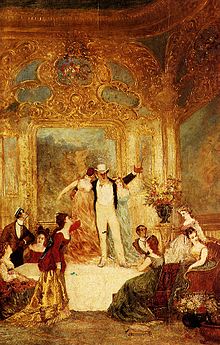- La Païva
-
Esther Lachmann, later Pauline Thérèse Lachmann, later Mme Villoing, later Mme la Marquise de Païva, later Countess Henckel von Donnersmarck, and generally known as la Païva (7 May 1819 - 21 January 1884) was the most successful of 19th century French courtesans. She was known for decadent parties given at the Hôtel de la Païva, her luxurious mansion at the Champs-Elysees in Paris, which became a symbol of the Second Empire, an exemplar of the taste of the time.
She was born to Jewish parents of Polish ancestry in the Moscow ghetto, where her parents Martin Lachmann, a weaver, and his wife Anna Amalie Klein had taken refuge. On 11 August 1836, aged seventeen, she married Antoine Villoing, a tailor. Together they had one son. Esther fled the marriage, and took up residence in the slums of Paris, near the Église Saint-Paul-Saint-Louis, assuming the name Thérèse, and set about trying to find a rich suitor.
 Une Soireé Chez La Païva by Adolphe Joseph Thomas Monticelli
Une Soireé Chez La Païva by Adolphe Joseph Thomas Monticelli
She found one in Henri Herz, a pianist, and became his mistress, gaining entry into artistic, though not aristocratic, society. It is generally believed that they married in London, but it is not clear that this actually occurred - in any case, such a marriage would have been bigamous. By him she had a daughter.
Richard Wagner, Hans von Bülow, Théophile Gautier, and Emile de Girardin attended her salon. Thérèse's spending nearly ruined Herz's finances, and he traveled to America in 1848 to pursue business opportunities. While he was away, her spending continued, and Herz's family turned Thérèse out of the house in frustration. She took up residence at the hôtel Valin. One of her friends, Esther Guimond, took her to a milliner, Carnille, who advised her to go to London, with an arsenal of couture, to seek her fortune. At Covent Garden, Thérèse captured the attentions of Lord Stanley.
She returned to Paris, and from there to the spa at Baden, where she met a Portuguese marquis, Albino Francesco de Païva-Araujo. Her first husband had died of consumption, so she was free to marry the marquis on 5 June 1851, acquiring a fortune, a title, and her nickname, La Païva. The day following, Horace de Viel-Castel wrote, she told her husband, "You wanted to sleep with me, and you've done so, by making me your wife. You have given me your name, I acquitted myself last night. I have behaved like an honest woman, I wanted a position, and I've got it, but all you have is a prostitute for a wife. You can't take me anywhere, and you can't introduce me to anyone. We must therefore separate. You go back to Portugal. I shall stay here with your name, and remain a whore." And, indeed, the marquis returned to Portugal, leaving her behind. The marriage was not annulled until 16 August 1871, and the marquis shot himself in 1872.
Cornelia Otis Skinner wrote that one of La Païva's conquests was a banker of whom she demanded twenty banknotes of one thousand francs each - which, she stipulated, he must burn one by one during their lovemaking. The banker decided to substitute counterfeit banknotes. Even so, the sight of their incineration was so unnerving that he could not accomplish his part of the tryst.
According to Richardson's biography, La Païva was hard and unforgiving to her many servants, and she once shot a horse that had thrown her off.[1]
Her final conquest was Guido Henckel von Donnersmarck, a famously rich Prussian count eleven years her junior, who gave her the Château de Pontchartrain in Seine-et-Oise and the famous yellow Donnersmarck diamonds. She married him on 28 October 1871. With his money, she erected the most elegant mansion in Paris, the Hôtel de la Païva at the Champs-Elysees, designed by Pierre Manguin. Viel-Castel says she regularly wore some two million francs' worth of diamonds, pearls and other gems.
It was widely believed, though never proved that she and her husband were asked to leave France in 1877 on suspicion of espionage. In any case, they went to live in Henckel's castle at Neudeck in Upper Silesia; he had a second estate at Hochdorf in Lower Silesia.
She died at their castle in Neudeck on 21 January 1884, aged 64. According to legend, her husband preserved her body in embalming fluid, which was later discovered by his next wife.[2][3]
Notes
- ^ "The Great Courtesans", Decadenthandbook's Blog, November 24, 2009, http://decadenthandbook.wordpress.com/2009/11/24/the-great-courtesans/
- ^ Richardson.
- ^ "French 'Love palace' built by famous prostitute restored", Telegraph, 28 Mar 2010, http://www.telegraph.co.uk/news/worldnews/europe/france/7533280/French-Love-palace-built-by-famous-prostitute-restored.html
References
- Pierre Levellois and Gaston d'Angelis (ed. dirs.), Les châteaux de l'Ile de France, pp. 170–172. Paris: Hachette, 1965. English translation of French edition of 1963.
- Joanna Richardson, The Courtesans: The Demi-Monde in 19th-Century France, pp. 50–66. London: Phoenix Press, 2000).
- Virginia Rounding, Grandes Horizontales: The Lives and Legends of Four Nineteenth-Century Courtesans. London: Bloomsbury, 2004. ISBN 978-1582344508
- Cornelia Otis Skinner, Elegant Wits and Grand Horizontals, pp. 221–222. Boston: Houghton Mifflin Company, 1962.
External links
Categories:- French courtesans
- 1819 births
- 1884 deaths
Wikimedia Foundation. 2010.
